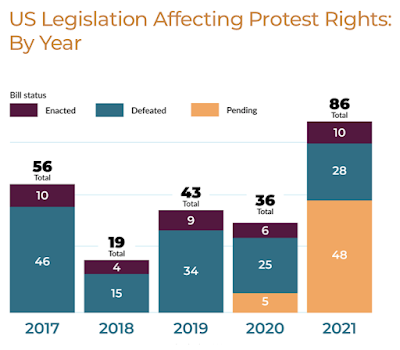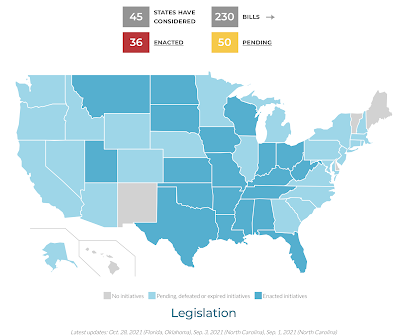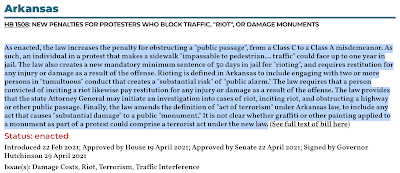Public protests are often the only way that citizens of a nation can express their sentiments to governments who seem incapable of hearing what the voting public wants. In the United States, the First Amendment to the U.S. Constitution protects Americans' right to assemble and express their collective viewpoints through protest even though those views may not be popular, particularly with the ruling class. That said, the rights are under threat with both state and federal government proposing legislation that would suppress these rights as you will see in this posting.
The International Center for Not-For-Profit Law or ICNL has developed a US Protest Law Tracker which has followed state and federal initiatives that restrict the right to peaceful assembly since November 2017. Here is a quote from their website:
"Since January 2017, the U.S. has seen a wave of anti-protest bills introduced by state and federal lawmakers that would limit the right to protest. These bills are often introduced in response toprominent protest movements, including for racial justice, against the construction of oil and gas pipelines, campus demonstrations, and better working conditions for teachers.
This anti-protest legislation is not only unnecessary but undermines constitutional rights. The overwhelming majority of protests in the United States are non-violent, and it is already illegal to destroy property or engage in violence. Instead of refining or better targeting existing law to address legitimate needs, these bills can be used as blunt instruments against peaceful and constitutionally protected protest.
Recent anti-protest legislation restricts the freedom of assembly in a variety of ways. Some bills control the traditional elements of where, when, and how people can assemble; others create extreme penalties for common infractions connected with protests like blocking sidewalks or streets; some create liability for protesters or organizers for the criminal actions of others; and others limit liability for those who commit violent acts against protestors, such as hitting them with their vehicle. Many bills include multiple types of these provisions that undermine peaceful demonstrations."
According to ICNL, there are several common means that anti-protest bills use to undermine peaceful protests:
1.) Extreme penalties for offences commonly related to protesting: In one example, trespassing near a pipeline in Louisiana can result in a prison sentence of five years.
2.) Vague and overly broad provisions that can capture peaceful protests: bills that include activities that would not normally be considered as "rioting". In one example, rioting in Florida can result in the capture of peaceful protestors who are part of a larger crowd where a small number of individuals engage in property destruction which can include kicking over trash cans. Under this law, the "imminent danger" of damage can be used as a reason for arrest.
3.) Expanding liability: In one example, organizations that conspire with trespassers near an oil and natural gas pipeline can result in liability of up to $1 million under a 2017 bill enacted in Oklahoma.
4.) Encouraging violence against protestors: In one example, drivers in Iowa are shielded from civil liability if the injure or kill an individual who is unlawfully blocking a road during a demonstration, riot or unlawful assembly. A bill in Florida provides an exemption from civil liability to anyone who injures or kills a victim if that victim was most likely participating in a "riot".
Here is a graphic showing the total number of bills (by status) in the United States that will impact the right to protest by year noting the very significant increase in 2021:
Here is a graphic which tracks protest laws by state:
Let's look at four examples of bills that are pending to show just how broad the definition of protesting has become:
1.) Florida:
2.) Indiana:
3.) Iowa:
4.) Federal:
Here are three examples of bills that have recently been enacted:
1.) Arkansas:
2.) Louisiana:
3.) Missouri:
When looking at the total number of protest laws being enacted, North Dakota, South Dakota and Tennessee lead the pack with each state enacting four bills which restrict the right to peaceful assembly followed by Arkansas and Oklahoma at three each. In some cases, states have defined an "unlawful assembly" as a group of three or more people and a"riot" as a group of two or more people assembled "in a violent manner" that "disturb[s]" other people, with any unlawful force by anyone in the group and the definition of "disturb" left up to the discretion of the police system.
Throughout U.S. history, protests have played a key role in the shaping of the nation. Without protests, the suffrage and racial justice movements would not have taken place. In the 21st century, it is becoming increasingly clear that governments wish to quash this aspect of American society because it threatens their monopoly on power and that simply will not be acceptable in this age totalitarianism.














No comments:
Post a Comment